What Japan did in WWII - Malaysia (prologue)
An innovative TV program was on air November 2005 in Kyshu and Chugoku area which cover almost 10 % of the total population of Japan.
Actually I didn't watch the program, but a blogger, Kobayashi, recorded the whole thing and posted in Japanese. At first, he thought the program would be amenable to China and Korea as usual programs. But this one was completely different from others, and that's the very reason he found it interesting, and so did I.
Several countries were picked up with an emphasis on those ruled by Imperial Japan, and I'll post each country from now on, spending several posts.
I believe this kind of programs have never been broadcasted because speaking of any bright side of Japan was kind of taboo. However, Kobayashi concluded that this program will be overlooked because it's a tiny local program. I agree.
Anyway, I'm sure these upcoming posts shed a light on those who don't understand the way Japanese think of WWII apart from whether they are right or wrong.
The list of what I posted is as follows. Just click the link.
Malaysia
Myanmar
Indonesia
Taiwan
United Kingdom
Palau
Korea
I would like to thank Kobayashi for his courtesy, and I linked his website for those who read Japanese:
http://fiorina.blog24.fc2.com/
The contents of the TV program starts from here.
The staff flew to Malaysia.
Narator: We've come to Coventry, England, driving north about 100km from London. We met a veteran there, Leslie Denistion, who was in colonized Malaysia before attacked by Japan.
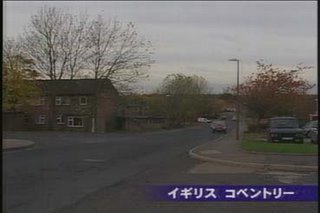 Leslie: We led a life of decadence there. The entity of colonies was just for the joy of white people. Everyone enjoyed the freedom, liberated from bothering concernings and thinking about just ourselves until Japan started the war. I think those colonies have a special atmosphere in which British felt superior to indigenous tribes, I mean, asian. We considered British as a noble collection of people over those asians.
Leslie: We led a life of decadence there. The entity of colonies was just for the joy of white people. Everyone enjoyed the freedom, liberated from bothering concernings and thinking about just ourselves until Japan started the war. I think those colonies have a special atmosphere in which British felt superior to indigenous tribes, I mean, asian. We considered British as a noble collection of people over those asians.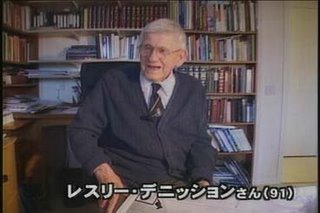
 Narator: The circumstance completely altered their life: Japan declared a war against British, and invaded Malay Peninsula in 1941. Kota Bharu, a small town located in the east of Malaysia with a lot of muslims, became a historical battlefield in one day. A fleet of Japan showed up along Sabak coast of the town.
Narator: The circumstance completely altered their life: Japan declared a war against British, and invaded Malay Peninsula in 1941. Kota Bharu, a small town located in the east of Malaysia with a lot of muslims, became a historical battlefield in one day. A fleet of Japan showed up along Sabak coast of the town. 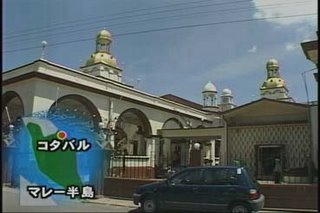
 Narator: The landing operation began at 1:30 A.M., an hour and fifty minutes earlier than Pearl Harbor attack. We happend to find an old man, Haleen, who witnessed the landing of Japanese fleet.
Narator: The landing operation began at 1:30 A.M., an hour and fifty minutes earlier than Pearl Harbor attack. We happend to find an old man, Haleen, who witnessed the landing of Japanese fleet.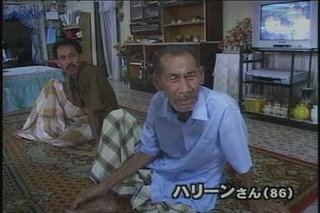 Haleen: As the Japanese fleet was seen from here, British opend fire first. I couldn't see anything but lights since it was night.
Haleen: As the Japanese fleet was seen from here, British opend fire first. I couldn't see anything but lights since it was night.
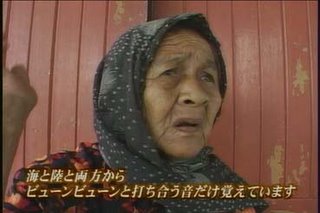 Narator: Fatimo says that she escaped from the battle to the top of the nearest hill.
Narator: Fatimo says that she escaped from the battle to the top of the nearest hill.
Fatimo: I only rember the sound of gunfires from both the sea and the land. Narator: According to Kelantan State Museum in Kota Bharu, the Japanese fleet attacked Sabak coast to occupy Kota Bharu Airport.
Narator: According to Kelantan State Museum in Kota Bharu, the Japanese fleet attacked Sabak coast to occupy Kota Bharu Airport.
Narator: Shiroato, who lives in Japan, was a member of the amphibious task force that landed first on Malaysia.
Shiroato: The British troops built a trap of wire entanglement at ebb tide. Unfortunately, when landing, the tide came in. So we run upon the wire. Then they shot at the bottom of our ships. We had nothing to do but jumping into the sea.
 Shiroato: I still remember hearing lots of bullets skim on water.
Shiroato: I still remember hearing lots of bullets skim on water.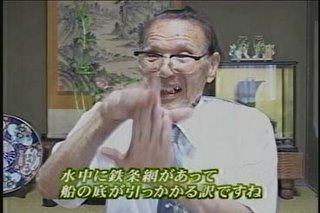 Narator: Conquering the battle, Japanese troops went south into Kuala Lumpur by the new year day of 1942 after several fierce battles.
Narator: Conquering the battle, Japanese troops went south into Kuala Lumpur by the new year day of 1942 after several fierce battles.
Narator: Did you regard Asian with hostility?
Leslie : Right.
Leslie: Yes, I did.
Narator: Did you ever think about you defeated by Japan?
Leslie: I still remember that my superior commanded us to defend Singapore. "America managed to defend against Japan at island Batan with a half force of them. Since Japan turned out to be weak, we can defend Singapore," he said. However, he surrendered 5 days after that speech.
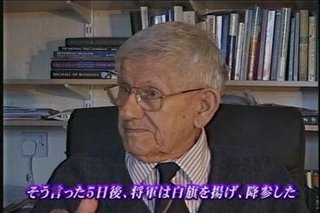 Narator: The team of Shiroato was then transferred to Bilma to assist the friendly troops against British. In other words, the main battlefield was shifted to Bilma.
Narator: The team of Shiroato was then transferred to Bilma to assist the friendly troops against British. In other words, the main battlefield was shifted to Bilma.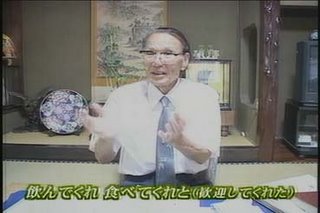
Shiroato: On our miles of march, people gathered to the edge of the road, and handed us water, food and flower. Obviously they welcomed us.
Narator: Is it really true that Burmese people welcomed Japanese ? We will fly to Bilma to confirm that in the next report.
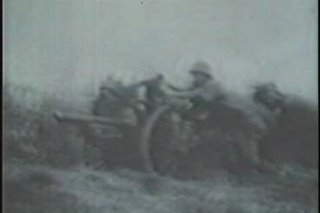
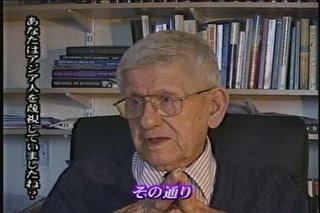
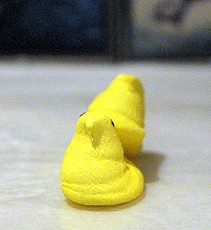

0 Comments:
Post a Comment
Subscribe to Post Comments [Atom]
<< Home